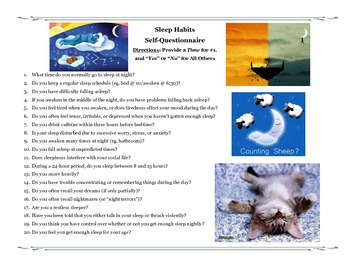Psychology Sleep/Dreams Unit: Evaluating Habits Questionnaire+Analysis
Engaging Language Arts and Psychology
188 Followers
Grade Levels
9th - 12th, Higher Education, Adult Education, Homeschool
Subjects
Resource Type
Standards
CCSSRST.9-10.3
CCSSRST.11-12.3
CCSSWHST.9-10.7
CCSSWHST.9-10.9
CCSSWHST.9-10.10
Formats Included
- PDF
Pages
1 page
Engaging Language Arts and Psychology
188 Followers
Description
This is a newly updated 2013 PDF sleep habits questionnaire which works perfectly as an attention-grabber or K-W-L activity to introduce a Psychology 1, 2, or AP unit on Sleep/Dreams and Consciousness. Reinforce the notion that students should answer as honestly as possible, and it'll be a genuine eye-opener. Continuing from here into a full, broader Consciousness unit, teenagers/young adults will soon see they need MUCH more sleep than they are getting on a typical night.
In taking this questionnaire, students are invited to develop the Common Core expectations of 21st Century skills, including critical thinking and problem-solving; they also will hone their abilities within the higher levels of Bloom's Taxonomy (eg. moving beyond understanding to application, analysis, AND evaluation)!
Consider also the Psychology Unit Intro. to Consciousness/Stages of Sleep PPT for your Sleep/Dreams unit, along with the PDF Dream Theories and Journaling + Critical Thinking Pack -- both available as reasonably-priced digital downloads in my TpT store! Finally, it would be a no-brainer to also consider purchasing Psychology: Daydreaming~Informational Text with Critical Thinking Analysis in my store alongside this sleep questionnaire.
Thank you for visiting my store, and I look forward to your feedback!
In taking this questionnaire, students are invited to develop the Common Core expectations of 21st Century skills, including critical thinking and problem-solving; they also will hone their abilities within the higher levels of Bloom's Taxonomy (eg. moving beyond understanding to application, analysis, AND evaluation)!
Consider also the Psychology Unit Intro. to Consciousness/Stages of Sleep PPT for your Sleep/Dreams unit, along with the PDF Dream Theories and Journaling + Critical Thinking Pack -- both available as reasonably-priced digital downloads in my TpT store! Finally, it would be a no-brainer to also consider purchasing Psychology: Daydreaming~Informational Text with Critical Thinking Analysis in my store alongside this sleep questionnaire.
Thank you for visiting my store, and I look forward to your feedback!
Total Pages
1 page
Answer Key
Does not apply
Teaching Duration
30 minutes
Report this resource to TPT
Reported resources will be reviewed by our team. Report this resource to let us know if this resource violates TPT’s content guidelines.
Standards
to see state-specific standards (only available in the US).
CCSSRST.9-10.3
Follow precisely a complex multistep procedure when carrying out experiments, taking measurements, or performing technical tasks, attending to special cases or exceptions defined in the text.
CCSSRST.11-12.3
Follow precisely a complex multistep procedure when carrying out experiments, taking measurements, or performing technical tasks; analyze the specific results based on explanations in the text.
CCSSWHST.9-10.7
Conduct short as well as more sustained research projects to answer a question (including a self-generated question) or solve a problem; narrow or broaden the inquiry when appropriate; synthesize multiple sources on the subject, demonstrating understanding of the subject under investigation.
CCSSWHST.9-10.9
Draw evidence from informational texts to support analysis, reflection, and research.
CCSSWHST.9-10.10
Write routinely over extended time frames (time for reflection and revision) and shorter time frames (a single sitting or a day or two) for a range of discipline-specific tasks, purposes, and audiences.


